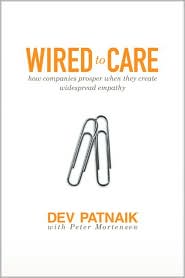Today, I spoke to Pete Mortensen, who is the communications lead for Jump Associates and author of Wired to Care. In this interview, Pete talks to us about how important empathy is, especially in a time of economic crisis and uncertainty. He also mentions the benefits of empathy at a company, how companies can brand themselves as empathetic, and how you yourself can use empathy as a competitive advantage in your career.
Why is empathy something companies should be focusing on today, in the midst of an economic crisis?
Because in tough times, there’s no time to waste on slow, bad decision-making. They need to act quickly, and they need to be right. The punishment for failure is that much greater than in good times. Empathy can provide the answer. If companies had a widespread sense of empathy within their walls, they wouldn’t spend time arguing about issues that should be intuitively obvious – they would just know how to create value for the people who matter most – the folks who visit their stores, use their products, and ultimately pay everyone’s salaries.
We’re in a fundamental reset of the economy right now, and companies need to reinvent their business, both in terms of the products and services they offer and in the ways they actually do business internally. Unfortunately, the path forward isn’t always clear. A strong sense of empathy and connection to the people you serve can be a compass during uncertain time.
What are the benefits of a widespread sense of empathy inside a company?
When people in an organization develop a shared and intuitive vibe for what’s going on in the world, they’re able to see new opportunities faster than their competitors, long before that information becomes explicit enough to read about in the Wall Street Journal. They have the courage of their convictions to take a risk on something new. And they have the gut-level intuition to see how their actions impact the people who matter most: the folks who buy their products, interact with their brand, and ultimately fund their 401(k) plans. That intuition transcends what’s traditionally referred to as market research.
A widespread sense of empathy starts to influence the culture of a place, giving it a sense of clarity and mission. People spend less time arguing about things that ultimately don’t matter. Empathy can even start to ensure more ethical behavior in a way that no policies and procedures manual ever could. It can even help us all to have a better day at work, because we can see the positive impacts that our work has out in the world.
How can companies build empathy on a more widespread basis?
There are really three steps:

- Get out of your office, and go where people are: homes, shops, restaurants, theme parks, wherever they are really themselves. That’s why Dave Schenone, the innovation director at Nike, spends as much time as he can visiting with young athletes, both on the court and off, to really understand the role sports plays in their lives, and what Nike can do to support that.
- Be genuinely interested in other people. Forget about what you do and care about their needs. That’s what helped Lou Gerstner turn IBM around in the early 1990s. Instead of spending his time worried about how to convince businesses to buy more technology, he made his managers spend more time understanding the problems their customers were having, and then figure out what IBM could do to help. Find the real needs first, and your solutions will dramatically improve, too.
- Bring evidence of the real world back into your offices. Harley-Davidson never forgets that the people that really count are the folks outside their walls, because they paper their headquarters with photos of the real people they meet on rides, at rallies, and at factory tours. The entire building is a temple to the story that Harley and its riders and enthusiasts have co-created together.
What if you have a lot of businesses? It seems a lot harder to have empathy if you’re a conglomerate.
That’s absolutely correct, and it highlights the problems with the most superficial kind of empathy that companies can develop. Sure, at Nike, their running shoes tend to be great because the people who founded the company were runners, and everyone who works on a running shoe today is a runner themselves. But that kind of affinity is almost never enough for a company of any size. Even Nike has had to learn to systematically get outside of its walls and learn to see the world through the eyes of other people.
That’s why they have their employees spend lots of time hanging out with teenage skateboarders and mountain bikers and other businesses Nike struggled to enter for years. The same is true at any organization; to maximize the benefits of empathy, everyone, from design and marketing to HR and finance, needs to spend some time getting a sense for the lives of people outside their walls.
Why should people interested in building their personal brands care about empathy? Are there benefits to individuals, as well?
Empathy leads to growth – not just for businesses, but for individuals, too. If you’re building a personal brand, a strong sense of empathy allows you to connect more closely with the audiences you care about, build a loyal following, and have a clearer sense of what you do that truly matters to other people.
There’s a hidden benefit to empathy. Especially in times of monumental change, it can be easy to slip into survival mode. With layoffs in the news and more in the offing, it’s hard to maintain any sense of perspective of purpose. At the end of the day, when you’re connected to the people you serve, you get something that so many of us lack today: a sense of meaning in the work we do. It can turn a career into a calling.
———-
Pete Mortensen is the communications lead for Jump Associates and co-author of Wired to Care. Pete has a particular talent for articulating and expressing social, design and business questions in surprising forms. A journalist by training, he has written for and edited numerous monthly, weekly and daily publications, including Spin Magazine, nyou, the Holland Sentinel, the Windsor Times and Wired News. Pete has covered a wide variety of technology, design and cultural topics, including a wine country Rock Paper Scissors Tournament and Latino break dancers living in the cradle of the conservative Dutch Reformed Church. He is the lead blogger for Wired’s Cult of Mac, where his insight into design and broad knowledge of Silicon Valley lore coalesce into a few minutes a day of outrage, news and humor in the world of Apple Inc. Pete holds a dual bachelor’s degree in journalism and English literature from Northwestern University.






